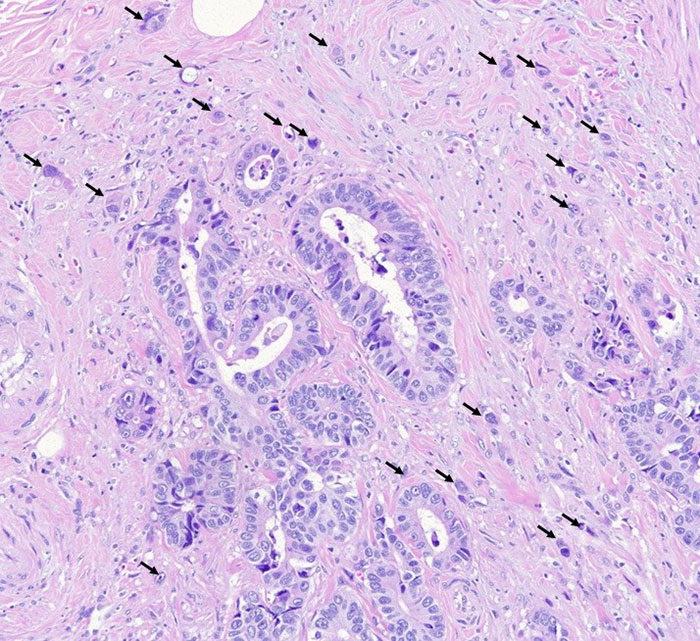Consensus in the Fight Against Colorectal Cancer

Tumor buds (marked by the black arrows) are single cells or small clusters of tumor cells which detach from the main tumor body and invade surrounding tissue. Picture: University of Berne, Institute of Pathology
With over a million new cases per year, colorectal cancer is one of the most commonly diagnosed cancers across the globe. Despite recent advances in medical research, the prognosis of patients who present with advanced tumors remains relatively poor.
The treatment of colorectal cancer requires an interdisciplinary approach. After surgery is performed to remove the cancer with part of the colon, the specimen is then examined by a physician with specialist training pathology who is responsible for confirming the diagnosis and determining tumor stage.
Additionally, in order to evaluate the biological behavior of an individual tumor the pathologist can also examine certain biomarkers, either microscopically or by additional molecular analysis. The information from such biomarkers may be of prognostic value, or predict response to a given therapy, so that treatment strategies can be tailored to individual patients.
Biomarkers for more precise prognosis
The phenomenon of ‘tumor budding’ has received increasing attention in the medical literature as an indicator of aggressiveness in colorectal cancer. Single cancer cells or small clusters of cancer cells gain the ability to detach from the main tumor body and increase the risk of colonization of other organs via lymphatic and blood vessels, ultimately leading to fatality.
However, until now, there has been no established and internationally recognized system to assess tumor budding in order for it to be used to influence clinical management decisions that directly affect patient care.
Bernese efforts to achieve consensus
At the end of April 2016, an international tumor budding consensus conference (ITBCC) initiated by the Colorectal Cancer Research Group was held in order to develop an internationally standardized method of assessing tumor buds. The method is cheap, can be performed anywhere and can replace in some circumstances expensive molecular testing.
This was a revolutionary step in improving biomarker assessment in colorectal cancer. The next step is to implement tumor budding as a prognostic indicator in national guidelines as well as colorectal cancer reporting recommendations of the World Health Organization (WHO), the UICC (Union Intérnationale Contre le Cancer) and the AJCC (American Joint Committee on Cancer).
«Reporting of tumor budding by pathologists worldwide will help serve as the basis for future clinical studies geared at the development of novel therapies targeted at tumor buds», says Alessandro Lugli, Head of the Division of Clinical Pathology at the Institute of Pathology.
http://www.unibe.ch/news/media_news/media_relations_e/media_releases/2016_e/medi…
http://www.pathology.unibe.ch/index_eng.html
Media Contact
All latest news from the category: Health and Medicine
This subject area encompasses research and studies in the field of human medicine.
Among the wide-ranging list of topics covered here are anesthesiology, anatomy, surgery, human genetics, hygiene and environmental medicine, internal medicine, neurology, pharmacology, physiology, urology and dental medicine.
Newest articles

Innovative vortex beam technology
…unleashes ultra-secure, high-capacity data transmission. Scientists have developed a breakthrough optical technology that could dramatically enhance the capacity and security of data transmission (Fig. 1). By utilizing a new type…

Tiny dancers: Scientists synchronise bacterial motion
Researchers at TU Delft have discovered that E. coli bacteria can synchronise their movements, creating order in seemingly random biological systems. By trapping individual bacteria in micro-engineered circular cavities and…

Primary investigation on ram-rotor detonation engine
Detonation is a supersonic combustion wave, characterized by a shock wave driven by the energy release from closely coupled chemical reactions. It is a typical form of pressure gain combustion,…



